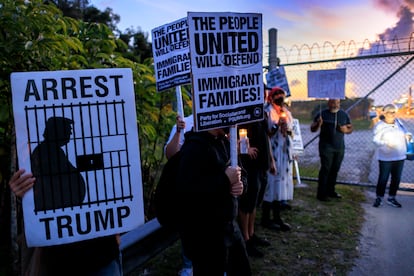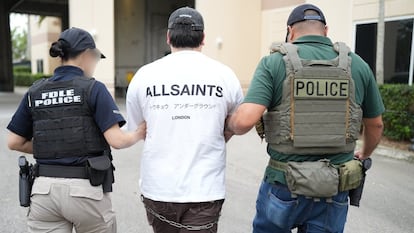The anti-immigration crackdown sparks panic and anger in Florida’s Hispanic community
ICE officers have been on the lookout for undocumented immigrants outside Miami courthouses since last week


He instructed his cousin to pay next month’s rent in his absence. He left a record of what to do with each of the belongings he’d accumulated over the past two years. In case he didn’t return, he parked his 2021 Chevrolet and called an Uber to the Miami Immigration Court building. At 1 p.m. on Tuesday, he had an appointment with the judge to argue his asylum case, and Felipe—the name used to protect his identity—thought for the first time that he might be deported. Since last week, Immigration and Customs Enforcement (ICE) officers have been on the lookout for migrants outside Miami courthouses, trying to detain as many undocumented immigrants as they can. People are afraid. In fact, they are terrified.
Almost at the last minute, Felipe, 28, received an urgent call from his lawyers’ office. They asked him to leave the building immediately and go to their offices because ICE agents were detaining almost everyone showing up before the authorities. Within half an hour, Felipe was with his lawyers, who requested an online hearing from the judge to avoid his arrest in court. For the moment, everything seems all right for him. The judge has assured him that he will have until 2029 to defend his case.
It’s the same amount of time that Dunia—who has lived in the U.S. for four years and also prefers to remain anonymous—was given a week ago when she showed up at the downtown Miami building with her baby. “Everything was extremely tense; the ICE officers were there in plain clothes. They say they took 18 people away last Wednesday, and 10 on Thursday. It’s horrible,” she says. “The time has come for those of us with I-220As [a form showing that a migrant has been released by ICE but which does not confer lawful or permanent immigration status]; we were the ones left for them to go after. They first went after the parole beneficiaries, then the CBP One applicants, and now us.”
Both Felipe and Dunia left Cuba and arrived at the Mexican border hoping to obtain the permanent residency that Cuban citizens have enjoyed in the United States for decades. But things have changed. They remain in I-220A status, which has been granted to some 400,000 Cubans in recent years and prevents them from legalizing their status. Until now, migrants with a I-222A were not in danger. Florida politicians like Republican Congresswoman María Elvira Salazar promised them that they should not fear, that they are just one step away from legalization. But now many people are throwing the question back at Salazar. Recently, they called her a “traitor” on a billboard, along with other Republican politicians like Carlos Giménez and Mario Díaz-Balart.
The latest major immigration crusade in Florida is not about status, nor is it focused solely on the “criminals” who were allegedly the targets of Donald Trump’s anti-immigration agenda. The attorney Liudmila Marcelo explained to EL PAÍS that the Department of Homeland Security (DHS) and ICE are currently acting in accordance with a January 23, 2025 memorandum that details over which foreigners the DHS can exercise its authority and place them in expedited deportation proceedings. These are “foreigners who have been in the country for less than two years, who do not have an asylum case in court, or whose asylum judge determines that their asylum is deficient and does not merit a final court hearing.”
This isn’t a practice exclusive to Florida, but rather a national DHS strategy that has also gained traction in Las Vegas, New York, Phoenix and Los Angeles. Once at the hearing, the judge asks the migrants to dismiss the charges. If the person agrees, they lose their case in court and thus, according to the lawyer, have no more asylum claim to defend. This has created confusion in recent weeks, as until now, the dismissal of a case was considered good news for pursuing legal status. But no longer. “Once you are without the protection of a court case, you no longer have the right to defend your asylum before the judge and are at the disposal of the government to be placed in expedited removal proceedings, or, in other words, accelerated deportation,” says Marcelo, who says the procedure applies to migrants with I-220A status and people who arrived in the country through the CBP One application.

The attorney insists that authorities have been “deceptive” in their approach to immigration hearings in recent days. “This constitutes a violation of due process, due to the deceptive manner in which it was carried out,” she maintains. “When DHS offers to dismiss the case, they do so by claiming that the person is not a priority for deportation proceedings. In this way, they are deceiving the affected person into accepting the possibility of being left without protection and thus immediately placing them in deportation proceedings, contradicting the basis of the original offer.” ICE sources have told Fox News that “many more” detentions of this type will be seen from now on.
Experts agree that there is no defined criterion when choosing who will be the next detained migrant, but it is clear that they are driven by a larger plan: to accelerate detentions in order to meet the deportation quotas the current president promised during his campaign. To this end, Trump has an ally in Florida Governor Ron DeSantis, who even before the Republican candidate arrived at the White House was already enacting several laws that placed migrants in a much more vulnerable position.
This crusade “should concern us all”
During the first months of the year, DeSantis signed laws that once again made clear his anti-immigrant intentions. He proposed “automatic” and “mandatory” death penalty for those who remain in the country illegally and have been convicted of capital crimes. He advocated prohibiting illegal immigrants from obtaining driver’s licenses. And he allocated $298 million for immigration enforcement in the state.
As if that weren’t enough, he gave the Florida Highway Patrol (FHP) authority to detain migrants, in collaboration with ICE, something that has instilled panic in a community now afraid to use public transportation, go to work, or take their children to school. “There’s no one else in the country doing that,” the governor said at a press conference in Tampa. His goal is for state authorities to act independently of the federal government, assuming functions normally assigned to DHS.
Recently, authorities carried out Operation Tide, which they have described as the largest anti-immigration operation in Florida history, with a record 1,120 immigrants detained from April 21 to 26, thanks to the collaboration of several local agencies. They have also presented a strategy to create detention centers with capacity for up to 10,000 migrants, train National Guard agents to act as immigration judges, and promote self-deportation programs.
In a state where one in five residents is an immigrant and some five million were born abroad, many live with uncertainty. Attorney Liudmila Marcelo acknowledges that fear among migrants has increased the number of calls she receives from “desperate clients,” whether related to their immigration status or that of a family member. Recently, a young Cuban man she assisted, who had arrived in the country through CBP One, suffered a nervous breakdown and self-deported using the CBP Home app.
“If that situation affects a young man who is on the verge of legalizing his status under the Cuban Adjustment Act, can you imagine immigrants of other nationalities who have no hope of legalizing their status?” the lawyer says. “The majority of Venezuelans have been left without the protection of TPS and the work permit that this status grants. As a result, they can lose their driver’s licenses and be arrested for driving without proper authorization. I have truly never seen such widespread panic in the immigrant community.”
Adriana Rivera, communications director for the Florida Immigrant Coalition, agrees. She asserts that while the migrant community has also felt threatened in the past, “this time the fear has increased due to the rhetoric underlying the actions.” “Both the federal and state governments have verbally harassed and terrorized peaceful communities, including those with legal status. This has created an atmosphere of fear, uncertainty, mistrust, and a chilling effect; and that’s exactly what they want.”
For Rivera, however, something that “should concern us all” is the silence of some state politicians: “While some elected leaders are doing something to guarantee the safety and education of all the communities they serve, many more have remained completely silent and have even been complicit in these human rights violations.”
Sign up for our weekly newsletter to get more English-language news coverage from EL PAÍS USA Edition
Tu suscripción se está usando en otro dispositivo
¿Quieres añadir otro usuario a tu suscripción?
Si continúas leyendo en este dispositivo, no se podrá leer en el otro.
FlechaTu suscripción se está usando en otro dispositivo y solo puedes acceder a EL PAÍS desde un dispositivo a la vez.
Si quieres compartir tu cuenta, cambia tu suscripción a la modalidad Premium, así podrás añadir otro usuario. Cada uno accederá con su propia cuenta de email, lo que os permitirá personalizar vuestra experiencia en EL PAÍS.
¿Tienes una suscripción de empresa? Accede aquí para contratar más cuentas.
En el caso de no saber quién está usando tu cuenta, te recomendamos cambiar tu contraseña aquí.
Si decides continuar compartiendo tu cuenta, este mensaje se mostrará en tu dispositivo y en el de la otra persona que está usando tu cuenta de forma indefinida, afectando a tu experiencia de lectura. Puedes consultar aquí los términos y condiciones de la suscripción digital.








































